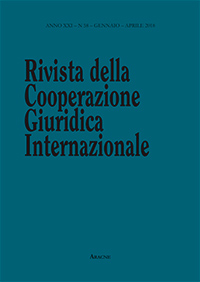Estratto da
RIVISTA DELLA COOPERAZIONE GIURIDICA INTERNAZIONALE
Quadrimestrale dell’Istituto Internazionale di Studi Giuridici
La sovranità condivisa della nuova Caledonia e le conseguenze sull’autodeterminazione dei Kanak
RIVISTA DELLA COOPERAZIONE GIURIDICA INTERNAZIONALE
Quadrimestrale dell’Istituto Internazionale di Studi Giuridici
La sovranità condivisa della nuova Caledonia e le conseguenze sull’autodeterminazione dei Kanak

The treatment of colonial powers to indigenous peoples is characterized by serious violations of human rights: from racial discrimination to economic exploitation to genocide. Even the society of the Kanak people of New Caledonia, the subject of more than a century of French colonial rule, has been destabilized in its political, economic and social arrangements. Thanks to the appropriation of lands, the creation of reserves and the nomination of tribal leaders enslaved by France, it was easy to alter the ancestral and tribal roots of the Kanaks. In this territory, France continues to behave like a colonizing power. Contrary to how it was desired and suggested by the United Nations starting from the General Assembly Resolution n.1541 (15th of January 1960).The status of New Caledonia as a Special Collectivity of France and the possibility of holding a referendum on the achievement of full independence has posed particular questions about the nature of Kanak’s right to self-determination. In the case of New Caledonia, decolonization took the form of a gradual process included in the normative and institutional framework of the French republic. A transfer of skills and powers that can be defined as a “shared sovereignty”, an ambiguous and controversial concept that is analyzed in the essay. From the point of view of international law, the archipelago is not sovereign, while for France, New Caledonia is a territorial entity sui generis that enjoys the status of emancipation. What remains is to await the new referendum of November 2018 and observe, possibly, the birth of a new state. But this does not mean erasing the damaging effects of over a century of colonialism.
| pagine: | 158-176 |
| DOI: | 10.4399/97888255125199 |
| data pubblicazione: | Aprile 2018 |
| editore: | Aracne |








